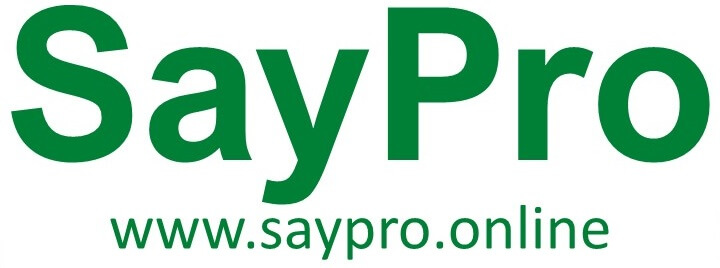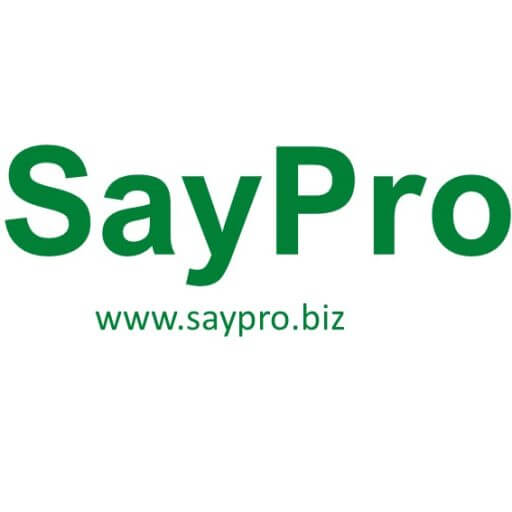Your basket is currently empty!
SayPro Social Program Evaluations Research Manager

Website SayPro
SayPro Social Program Evaluations Research Manager
Position Title: Research Manager, SayPro Social Program Evaluations
SayPro Overview:
SayPro is seeking a dedicated and analytical Research Manager to lead our Social Program Evaluations team. This role is crucial for assessing the effectiveness of social initiatives and ensuring data-driven decision-making within our programs. The ideal candidate will have a strong background in research methodologies, data analysis, and social impact evaluation.
SayPro Key Responsibilities:
– Design and implement comprehensive evaluation frameworks for various social programs.
– Lead qualitative and quantitative research efforts, including surveys, interviews, and focus groups.
– Analyze data and prepare insightful reports that highlight program outcomes and areas for improvement.
– Collaborate with program managers and stakeholders to develop evaluation criteria and goals.
– Present findings to internal teams and external partners, translating complex data into actionable recommendations.
– Stay updated on best practices in program evaluation and incorporate innovative approaches into evaluation processes.
– Supervise and mentor junior research staff, fostering a collaborative and learning-focused environment.
SayPro Qualifications:
– Master’s degree in Social Sciences, Public Health, or a related field.
– Proven experience in program evaluation, research design, and statistical analysis.
– Strong analytical skills with proficiency in data analysis software (e.g., SPSS, R, or equivalent).
– Excellent communication skills, both written and verbal, with the ability to convey complex information clearly.
– Experience in project management and ability to handle multiple projects simultaneously.
– Passion for social impact and commitment to improving community programs.
What We Offer at SayPro
– A collaborative and innovative work environment.
– Opportunities for professional development and growth.
– Competitive salary and benefits package.
Join SayPro and play a vital role in shaping effective social programs that make a difference in communities!
SayPro Research Objectives
SayPro Evaluate Program Effectiveness:
Outcome Measurement: Assessing whether the program meets its stated objectives and achieves the desired outcomes.
Impact Analysis: Measuring the direct and indirect effects of the program on participants and the community.
SayPro Assess Program Efficiency:
Resource Utilization: Evaluating how efficiently the program uses resources, including time, money, and personnel.
Cost-Effectiveness: Analyzing the cost-effectiveness of the program in achieving its goals compared to other potential interventions.
SayPro Identify Areas for Improvement:
Program Strengths and Weaknesses: Identifying the strengths and weaknesses of the program based on evaluation findings.
Best Practices: Highlighting best practices and successful strategies that can be replicated or scaled.
SayPro Provide Evidence-Based Recommendations:
Recommendations for Enhancement: Offering actionable recommendations to improve program design, implementation, and outcomes.
Strategic Adjustments: Advising on strategic adjustments to address identified issues and optimize program performance.
SayPro Research Methodologies
SayPro Evaluation Design:
Formative Evaluation: Conducting evaluations during program development and implementation to provide feedback for improvement.
Summative Evaluation: Assessing the overall effectiveness and impact of the program after completion.
SayPro Surveys and Questionnaires:
Participant Surveys: Collecting feedback from program participants to gauge their experiences, satisfaction, and perceived benefits.
Stakeholder Surveys: Gathering input from stakeholders, including program staff, partners, and funders, to understand their perspectives.
SayPro Interviews and Focus Groups:
In-Depth Interviews: Conducting interviews with program participants, staff, and other stakeholders to gather qualitative insights.
Focus Groups: Facilitating focus group discussions to explore participants’ experiences and gather collective feedback.
SayPro Data Analysis:
Quantitative Analysis: Using statistical methods to analyze survey and outcome data, and measure program effectiveness.
Qualitative Analysis: Analyzing qualitative data from interviews and focus groups to identify themes and insights.
SayPro Case Studies:
Detailed Case Studies: Examining specific instances of program implementation to understand successes, challenges, and lessons learned.
Comparative Case Studies: Comparing different programs or interventions to identify effective strategies and outcomes.
SayPro Program Documentation Review:
Review of Records: Analyzing program documentation, such as reports, plans, and records, to assess program implementation and performance.
Performance Metrics: Reviewing performance metrics and benchmarks used to evaluate program success.
SayPro Key Metrics and Indicators
SayPro Effectiveness Metrics:
Goal Achievement: Measuring the extent to which the program achieves its stated goals and objectives.
Outcome Indicators: Assessing specific indicators related to the program’s intended outcomes, such as changes in behavior, knowledge, or conditions.
SayPro Efficiency Metrics:
Resource Utilization: Analyzing how effectively resources are used in program implementation.
Cost-Effectiveness: Evaluating the cost-effectiveness of the program in relation to its outcomes and benefits.
SayPro Participant Satisfaction:
Satisfaction Levels: Measuring participant satisfaction with various aspects of the program, including delivery, content, and support.
Feedback Quality: Assessing the quality and relevance of participant feedback for program improvement.
SayPro Impact Metrics:
Social Impact: Evaluating the broader social impact of the program on the community or target population.
Long-Term Outcomes: Measuring long-term outcomes and sustainability of the program’s impact.
SayPro Program Implementation Metrics:
Adherence to Plan: Assessing how closely the program follows its original plan and objectives.
Operational Efficiency: Evaluating the efficiency of program operations and processes.
SayPro Data Analysis and Insights
SayPro Quantitative Analysis:
Statistical Techniques: Applying statistical techniques to analyze numerical data and determine program effectiveness and efficiency.
Trend Analysis: Identifying trends and patterns in data to evaluate program performance over time.
SayPro Qualitative Analysis:
Thematic Analysis: Analyzing qualitative data to identify themes and insights related to program implementation and outcomes.
Narrative Analysis: Understanding participants’ stories and experiences to gain deeper insights into program impact.
SayPro Reporting:
Evaluation Reports: Creating comprehensive reports that summarize findings, highlight key outcomes, and provide actionable recommendations.
Data Visualization: Using charts, graphs, and infographics to present data in a clear and accessible manner.
SayPro Actionable Recommendations
SayPro Program Enhancement:
Improvement Strategies: Recommending strategies to enhance program design, delivery, and effectiveness.
Best Practices: Identifying and promoting best practices for program implementation and management.
SayPro Resource Optimization:
Efficient Resource Use: Advising on ways to optimize resource allocation and utilization for better program efficiency.
Cost Management: Providing recommendations for cost management and budget optimization.
SayPro Stakeholder Engagement:
=
Improved Communication: Enhancing communication with stakeholders to keep them informed and engaged in program activities.
Feedback Integration: Incorporating stakeholder feedback into program improvement plans.
SayPro Strategic Adjustments:
Program Revisions: Suggesting revisions to program strategies and approaches based on evaluation findings.
Scaling and Replication: Advising on strategies for scaling successful programs and replicating effective models.
SayPro Implementation and Monitoring
SayPro Action Plans:
Detailed Planning: Developing detailed action plans to implement recommendations and address identified issues.
Timeline and Responsibilities: Setting timelines and assigning responsibilities for executing action plans.
SayPro Monitoring and Evaluation:
Ongoing Monitoring: Continuously monitoring program performance and impact to ensure alignment with goals.
Periodic Reviews: Conducting periodic reviews to assess progress and make necessary adjustments.
SayPro Feedback Loop:
Continuous Improvement: Using ongoing feedback and data to refine and enhance programs and interventions.
Adaptive Management: Adapting program strategies based on real-time data and evolving needs.





